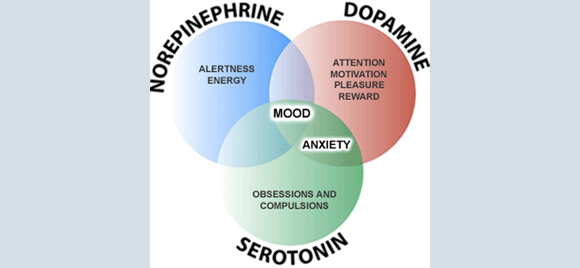
Brain Deficiency Quiz
13 Feb 2014, by in TestsYour unique brain chemistry (thecombination of the neurotransmitters acetylcholine, dopamine, GABA, and serotonin) controls how you think, feel, and behave. These deficiencies are the direct causes of many medical problems.
Knowing how to restore deficiencies or imbalances is the way to begin
Regaining your health. The results of this quiz will show you which
Neurotransmitters you are deficient in, and how to correct it using
supplements. By addressing your deficiencies you will be on the path to a healthier, younger you.
I. DOPAMINE
1. I crave sugar. T / F
2. I have decreased libido. T / F
3. I sleep too much. T / F
4. I have a history of alcohol or addiction. T / F
5. I have recently felt worn out for no apparent reason. T / F
6. I sometimes experience total exhaustion without even exerting myself. T / F
7. I have always battled weight problems. T / F
8. I have little motivation for sexual experiences. T / F
9. I have trouble getting out of bed in the morning. T / F
10. I have had a craving for cocaine, amphetamines, or Ecstasy. T / F
Total # of ‘T’ responses x 10: _____
II. ACETYLCHOLINE
1. I have insomnia. T / F
2. I have lost muscle tone. T / F
3. I don’t exercise any more. T / F
4. I crave fatty foods. T / F
5. I have experimented with hallucinogenics, LSD, or illicit drugs. T / F
6. I feel like my body is falling apart. T / F
7. I can’t breathe easily. T / F
8. I have difficulty remembering names when I first meet people. T / F
9. I don’t feel buoyant. T / F
10. I have noticed my memory ability is decreasing. T / F
Total # of ‘T’ responses x 10: _____
III. GABA
1. I feel shaky. T / F
2. I have frequent backaches and/or headaches. T / F
3. I tend to have shortness of breath. T / F
4. I tend to have heart palpitations. T / F
5. I tend to have cold hands. T / F
6. I sometimes sweat too much. T / F
7. I am sometimes dizzy. T / F
8. I am often nervous. T / F
9. I often feel fatigued even when I have had a good night’s sleep. T / F
10. I overeat. T / F
Total # of ‘T’ responses x 10: _____
IV. SERATONIN
1) I have night sweats. T / F
2) I always awake early in the morning. T / F
3) I can’t relax. T / F
4) I wake up at least two times per night. T / F
5) It is difficult for me to fall back asleep when I am awakened. T / F
6) I crave salt. T / F
7) I have less energy to exercise. T/F
8) I am sad. T/F
9) I tend to sleep in many different positions in order to feel comfortable. T / F
10) I have insomnia. T / F
Total # of ‘T’ responses x 10: _____
Results
1. Total “T” Responses: Dopamine Deficiency _____
2. Total “T” Responses: Acetylcholine Deficiency _____
3. Total “T” Responses: GABA Deficiency _____
4. Total “T” Responses: Serotonin Deficiency _____
SCORING:
Circle the highest number. This is your most deficient nature, and is the one which is most likely to lead to illness. Often, you burn out your edge just by being yourself. For example, if you are GABA deficient it is likely that you are a dopamine nature, these types often push themselves too hard at work and burn out their edge.
Any category with between 3 and 5 true statements is considered a minor deficiency.
Any category with between 6 and 8 true statements is considered a moderate deficiency.
If you have more than 8 true statements in any one category, it is considered a major deficiency and you need to get help immediately.
Minor deficits are the early warning signs of health problems. If ignored, they will eventually lead to more serious deficiencies, ultimately affecting your dominant nature.
If you fell into the moderate deficit range, you probably have already sought medical treatment for any number of ailments. Minor and moderate deficits can be treated without medications and usually respond to a combination of natural/nutritional supplements, hormonal and life-style changes. Refer to the Supplement Table on the
last page to find out which supplements might help in replacing your deficiencies.
Major deficits warrant medical treatment and should be addressed immediately. These deficits are treated as diseases, i.e. Parkinson’s disease, severe mood disorders, high blood pressure, memory loss, seizure disorder, depression, etc. These conditions most likely require medications: nutritional, hormonal and/or life-style changes will not be
adequate in addressing these problems. If you experience any of these symptoms or illnesses,



